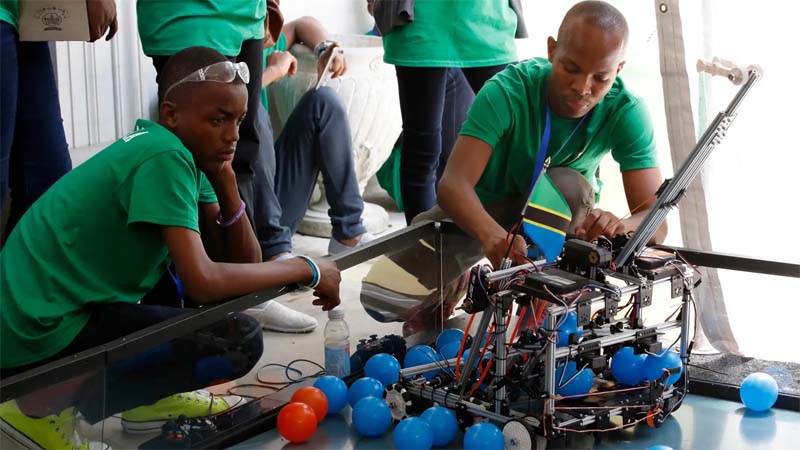“As African populations urbanize, seeking work in factories in the city, unlike Europe and North America’s industrialization, those jobs may already have been taken over by robots”
It was supposed to be Africa’s century, then the robots arrived.
The dawning of the fourth industrial revolution offered African countries the opportunity to take advantage of technological gains, leapfrogging their developed counterparts. As China did at the end of the last century, Africa could have taken advantage of relatively cheap, semi-skilled labor in its youthful population, finally diversifying the continent’s economies into manufacturing and services as engines for growth.
Instead, everything African workers could have done, robots can do better and faster. Industrial robots and artificial intelligence are increasingly threatening manufacturing in emerging markets. Economist Dani Rodrik calls this missed opportunity “premature deindustrialization” (pdf).
As African populations urbanize, seeking work in factories in the city, unlike Europe and North America’s industrialization, those jobs may already have been taken over by robots and other forms of technology, Rodrik posits. And it’s not just in factories, in service sectors, automation has created call-center jobs but it may also take them away, as the World Bank’s Digital Dividends study pointed out.
For now, Africa only has a regional average of two industrial robots per 100,000 manufacturing workers, according to the World Bank study. The continent could see its emerging markets shed jobs to automation far quicker than in countries like Japan, where the move toward automation has happened, ironically, more organically through local innovation rather than imported machinery.
The disruption introduced by smartphone apps like Uber offer a glimpse of what could happen in manufacturing. Industrial robots could have a far larger impact than a smartphone app, after all, it is far easier to build an app than a robot. Stoking the fear of robots on the continent is that they will take low- and semi-skilled jobs that should have employed Africa’s youthful and growing population, which brings with it a host of socio-economic challenges.
Take Botswana, the landlocked country known for diamonds and political stability. It’s also estimated that 18.4% of youth are unemployed, with some estimates rising up to about a third of young people. In mining, the country’s largest sector, robots are already going to depths that humans simply cannot reach, and bringing up tennis-ball sized stones.
The country has struggled to diversify its resource-driven economy to create jobs. In the retail and manufacturing sector, unions are already beginning to fear the coming of robots. They may know how to negotiate working hours and pay scales, but admit they are utterly unprepared for robots on the shop floor.
“There’s very little even unions can do,” said Dimpho Nyambe, the national organizing secretary for the Cashiers, Shop Assistants and Allied Workers Union in Botswana.
South Africa has been somewhat more successful at diversifying its resource-driven economy, but has already shed thousands of textile jobs to cheaper wages in Asia. Now, sewing industrial robots mean those jobs have little chance of returning, despite the government’s promises. The car-manufacturing sector, once the backbone of one of South Africa’s largest city, Port Elizabeth, also needs fewer human workers.
Robots may take away jobs, but they could also create new ones. A more optimistic view sees robots working with humans instead of replacing them, through augmentation, with human workers firmly in control of the machines, while machines make the humans more efficient.
It also means adopting a new model of manufacturing, according to PWC’s industrial internet of things report. Manufacturers should leverage automation by integrating artificial intelligence into their products. For Africa, it still presents an opportunity to become a manufacturing hub, but of much more complex products.
Much of the discourse around robots is driven by fear, but it could also be driven by innovation. Robots, could very well represent a different type of leapfrogging, this time in the job market.






